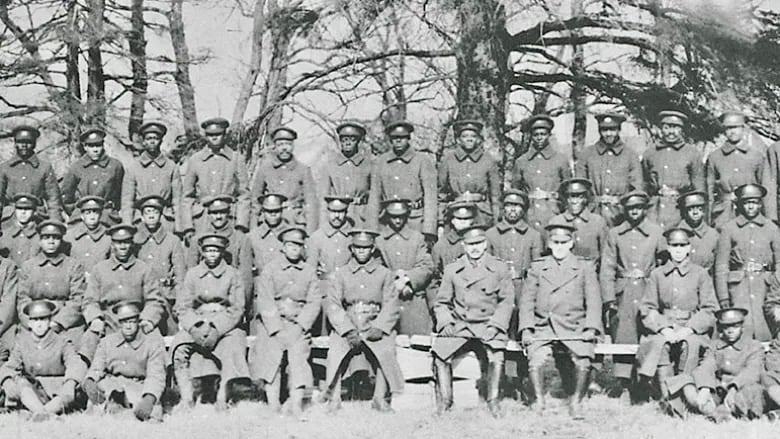Prime minister apologizes for anti-Black racism experienced by No. 2 Construction Battalion
Members of the battalion served with distinction in the First World War

The federal government has formally apologized to descendants and relatives of the men of the No. 2 Construction Battalion Saturday afternoon, 106 years after the formation of the historic battalion that faced anti-Black racism during the First World War.
The Nova Scotia-based battalion was the first military unit in Canada made up of mostly Black personnel. The battalion was primarily used in non-combat situations to clear trees, build roads, and maintain railway tracks.
Prime Minister Justin Trudeau said the gruelling work of battalion members was invaluable to the war effort.
He said despite their hard work, members were forced to live in segregated camps and not provided with proper medical care, rations or equipment.
"We cannot ever let what happened to No. 2 Construction Battalion happen again," Trudeau said. "And we cannot let the service of any member of our forces ever be overlooked and forgotten."

The prime minister apologized for the blatant anti-Black racism experienced by the men of the battalion and for the systemic racism that denied them their dignity, even in death.
"We are committed to meaningful change, where the dignity of all service members in the Canadian Armed Forces is upheld," Trudeau said. "Where everyone is welcome, where everyone can rise through the ranks, where everyone has opportunities to distinguish themselves."

Trudeau was joined at the apology by Anita Anand, the minister of national defence, Lt.-Gen. Frances Allen, vice-chief of the defence staff, and members of the national apology advisory committee.
Speaking after the prime minister, Anand said she is committed to taking concrete action to make the Canadian Armed Forces more inclusive and more reflective of Canada's diverse population.
"I am committed to eliminating systemic racism so that the discrimination faced by the No. 2 Construction Battalion and those who followed never happens again," she said.
"I am committed to celebrating and honouring the immense contributions of the No. 2 [Battalion] and all Black Canadians who have served our country in uniform and indeed the many Black Canadians who continue to do so today."
The event began with a parade at 12:30 p.m. AT and a ceremony at Truro's Amateur Athletics Club — the same area where the No. 2 Construction Battalion would have trained.
Some anti-racism activists and descendants of battalion members hoped the federal government would go beyond a formal apology and take "meaningful action" to do more for Black communities, by improving Black health and wellness, education, and economic and employment opportunities.
Nova Scotia's Black Cultural Centre, with the federal government, developed a database to help identify members of the battalion and their descendants.
People from Canada, the United States, Barbados and the West Indies with ties to the battalion were expected to travel to Truro.
For more stories about the experiences of Black Canadians — from anti-Black racism to success stories within the Black community — check out Being Black in Canada, a CBC project Black Canadians can be proud of. You can read more stories here.
